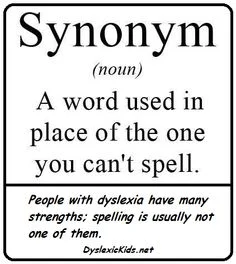Today, I was watching 'Glee' and nearly threw-up over the cat.
It wasn't that the people were annoying, the storyline repetitive or the songs increasingly disconnected from the plot.
... OK, all those things were true, but I'd still chosen to flick-on another episode. It's hard to be too critical and still maintain face while watching season four.
No, the problem was that they had a main character who was dyslexic.
Apart from the repetitive desire to win the next musical theatre competition, Glee's defining storylines concern a pupil whose differences make it a struggle for them to fit in at school. Through its seasons, the TV show has touched on issues that span sexuality, teen pregnancy, physical and mental disability, racism, poverty, metal illness and being so dumb you believed it possible that your cat could poop chocolate bars.
While I could not vouch for how accurately the situations were portrayed, I'd actually been quite impressed. Glee not only highlighted the more obvious problems with bullying, but it also raised other issues that might not be immediately considered. For example, the problem of bathrooms being gender segregated for a transsexual student.
Then in season four along comes Ryder Lynn; a failed student with a ridiculous Bieber-style haircut, who promptly lands the lead in the school musical after dancing like a prat on the football pitch. During an episode devoted to superheros, Ryder admits that his superman kryptonite is that he can't read well. He's promptly packed off for testing and the world seems that little bit brighter when it's discovered his problems in school stem from undiagnosed dyslexia.
Except that sunny brightness excluded me. I was green and sweating from watching the five minute extract from Ryder's dyslexia test .
[In case I fooled you all, I am dyslexic. Behind every (frankly) masterful blog post you see from yours truly is a very overworked spellchecker that I'm likely accidentally training for a terminator uprising.]
It wasn't that the test portrayal was bad: it was that it was actually very very good.
Ryder is given a spelling test, in which he understandably does poorly. However, the words he writes are not wildly wrong and neither are they anagrams. When he's shown as doing is getting the vowels mixed up.
Unlike the common joke involving a dyslexic who sold their soul to Santa, dyslexics do not jumble letters. To do that, I'd have to know what letters form a word and frankly, I've not got a clue. Vowels are particularly difficult (seriously people, they ALL SOUND THE SAME) along with 'p', 'b' and 'd' (that python language 'pdb' package? NOT COOL) and really anything over about four letters is just a large tin of tomato-staining alphabet spaghetti.
After that fun, Ryder is asked to read words on a card. Some he recognises and easily gives the correct answer: 'school', 'then', 'flowers'. Then he's given a made-up word which he's asked to sound out. He can't.
Not only had I never seen a presentation of dyslexia that got this right, I'm not even certain I knew it was a common attribute. I learnt to read by recognising the words as pictures. I imagine this is similar to what children do with pictorial languages like Chinese. However, doing this with English had two main consequences:
- My spoken and written vocabulary were entirely separate. This meant I struggled to read aloud and would frequently read a book without knowing how to pronounce the protagonist's name. I never needed to: I just recognised it when it appeared.
- It was a long time before I could sound out a word. To be honest, I still find it pretty difficult
Ryder also is unable to read words written backwards. I could do the first one (it was 'egg' for the record), mainly because I'm not very committed to text going left-to-right or right-to-left. But when the words got longer? Not. A. Clue. You've busted my picture up and you should be ashamed.
At that end of the test, Glee has two other lines for which they deserve applause. The first is Ryder outright asks the educational psychologist (or whoever is giving him the test) whether he's stupid. She assures him he's smart. If Ryder's storyline continues to be realistic, he won't believe a word of it since he's been stewing on this for years but ... it's a good effort. Then exiting the classroom, Ryder remembers he's in an episode with a superhero theme and says to a fellow student:
"Do you know what it's like to have a secret identity? To know inside you're not who everyone thinks you are?"
It's rather melodramatic, but I suspect everyone who struggled at school knows what it means.
Nowadays, my job is outwardly unaffected by dyslexia. No special allowances need to be made and I doubt it's mentioned anywhere in my employment record. It is also true that having to struggle in school may well have been an advantage later down the line.
I am forced to periodically growl at my computer's spellcheck, tackling a new language has been (to be polite) challenging, and it's true I can be a slow reader, especially under stress but... CRY MOAR. WE ALL GOT PROBLEMS. I deal with it and I'm sure I look awesome while I'm doing that dealing.
It is perhaps therefore a little strange that my cat had to flee the scene when it looked like her fur might be the mop for vomit and then tears.
The only conclusion I can reach is that nobody really wants to be this kind of superhero special, no matter how much acceptance it gets on TV.
--
Image credit: 'Glory of santa' picture by Sam Zamora
